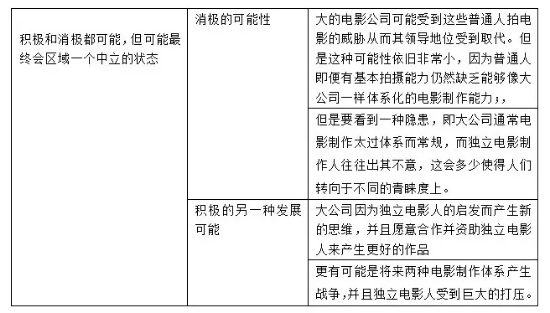Only large companies can make films before but due to fast development of technology, anyone can produce films. Positive or negative?
题目大意
从前只有大公司能制作电影而由于技术发展,人人可以制作电影,这是积极还是消极的发展?
写作思路解析
➡️消极的可能性:大的电影公司可能受到这些普通人拍电影的威胁从而其领导地位受到取代。但是这种可能性依旧非常小,因为普通人即便有基本拍摄能力仍然缺乏能够像大公司一样体系化的电影制作能力;但是要看到一种隐患,即大公司通常电影制作太过体系而常规,而独立电影制作人往往出其不意,这会多少使得人们转向于不同的青睐度上。
➡️积极的另一种发展可能:
大公司因为独立电影人的启发而产生新的思维,并且愿意合作并资助独立电影人来产生更好的作品,但是这种可能性也不太可能,因为人的本性往往是傲慢和敌对的,因此更有可能是将来两种电影制作体系产生战争,并且独立电影人受到巨大的打压。
提纲梳理见下
写作示范
The latest Iphone commercial shows a movie shot by the brand-new type of the product, starring Zhou Xun, one of the most famous actresses around China, or even in the world. Whatever the movie is talking about, it at least implies a fact that the technology has already permitted everyone to realize their film-making dreams by just using the daily commodities.
Whether the trend that everyone can produce films is positive for us or not depends entirely on what happens after informational explosion, a hypothetical future in which all types of stream media prevail our daily life, and become the one and the only way to deliver information to mortals. Some are afraid that one day, leading film makers like Hollywood, Netflix or HBO would gradually lose their superior status and are gradually replaced by those “Mr. nobody”. Right now, fictional depiction of the disastrous, over-depending information interactions and medias, or the great influences generated by a normal person who just unconsciously made a move is a total misconception because as of now the film making is still a relatively professional, cash-burning job, and even there are people out there who have the basic ability to well handle the cameras, they overwhelmingly still lack the ability to manage all parts and cruxes within the entire process as those professionals do. However, that doesn’t mean the movie making titans would always win—they are making the industry too regular and systematic, and the plots of movies too predictable, unlike the movie making from a regular person, who would relatively jump out of the conventions. Should clashes arise between the regular but magnificent movies and the low-cost but novel movies, it is still a question which side will win.
The above is one scenario where the professional producers and common persons are put into a tit-for-tat situation, but there is still an alternative possibility where cooperation has finally become the mainstream. Routinization of the movie producing implies that contents of the movies would be closer to daily life; characters and plots would be no longer that heroic and going to the same destination of defeating evils or resolving contradictions, but performing what we practically do in reality. At this juncture, those entertainment giants would be so wise to make a reflective thinking of the works of their own, and see those ordinary movie makers as a reference or partnership by offering them a chance to better use their talents, so that they could be supplied with money or professional equipment or teams to make a truly excellent cinematographic work. Whereas knowing what men are, full of hubris and prides, we know full well that this is not going to happen. We may wind up beaten and defeated like ones depicted in most entertainment-related movies or series, where a full-on war broke out between those titans with powers and resources and their fragile counterparts simply because of the normal individuals’ pacifist; difficult it seems for the normal giftedness to live or let live.
Just like most historical process, I believe that the final truth is somewhere in the middle. The routinization of technology brings us convenience and gives us a chance to do what once only the great companies can do; there is still nothing to worry about now seeing as how the normal persons have yet to become a threat to the authorities; there is no enough capabilities for most normal makers to gain the smoothness and cashes anyway. However, we might have to worry about what comes next once we have hit that threshold.


